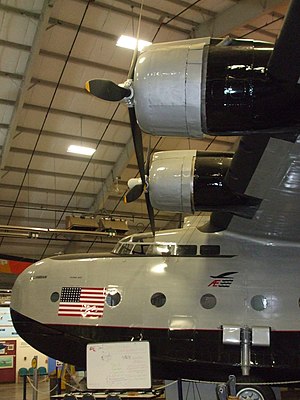Sikorsky VS-44
| VS-44 | |
|---|---|
 |
|
| Excambian | |
| Role | Flying boat |
| National origin | United States |
| Manufacturer | Sikorsky Aircraft |
| Designer | Igor Sikorsky |
| First flight | 13 August 1937 |
| Introduction | 10 February 1942 |
| Retired | 1968 |
| Primary users | American Export Airlines Tampico Airlines Avalon Air Transport Antilles Air Boats |
| Number built | 4 |
| Unit cost |
$400,000 US
|
The Sikorsky VS-44 was a large four-engined flying boat built in the United States in the early 1940s by Sikorsky Aircraft. The VS-44 was designed primarily for the transatlantic passenger market, with a capacity of 40+ passengers. Three units were produced: Excalibur, Excambian, and Exeter.
In the early 1930s, the primary mode of long-distance air travel over oceans was in flying boats, due to the ease of constructing docking facilities on shore without having to construct runways, and the possibility of malfunction forcing a sea landing. One flying boat designer was Russian immigrant Igor Sikorsky who had founded Sikorsky Aero Engineering Company when he came to the US in 1919. In 1930, his company became a subsidiary of United Aircraft.
In March 1935, the United States Navy was making plans for a new patrol bomber that would have increased performance and weapon load capability from their newly procured Consolidated YP3Y-1. Prototypes were ordered from Sikorsky in June 1935 and Consolidated Aircraft in July 1936. Sikorsky's entry, the XPBS-1 (Bureau Number 9995), made its first flight on 9 September 1937, the Consolidated XPB2Y-1 on 17 December of the same year.
The XPBS-1 was evaluated by the National Advisory Committee for Aeronautics (NACA) in 1938, but the Navy contract went to Consolidated. The XPBS-1 remained in naval service, temporarily operated by Patrol Wing Five at Norfolk, Virginia in 1939, then by Patrol Wing Two at Pearl Harbor, Hawaii, until it was finally assigned to transport squadron VR-2 at Naval Air Station Alameda, in 1940. On 30 June 1942, the XPBS-1 hit a submerged log upon landing at NAS Alameda. Among its passengers was CINCPAC Admiral Chester W. Nimitz who suffered minor injuries. One member of the flight crew, Lieutenant Thomas M. Roscoe, died. The XPBS-1 sank and was lost.
...
Wikipedia
